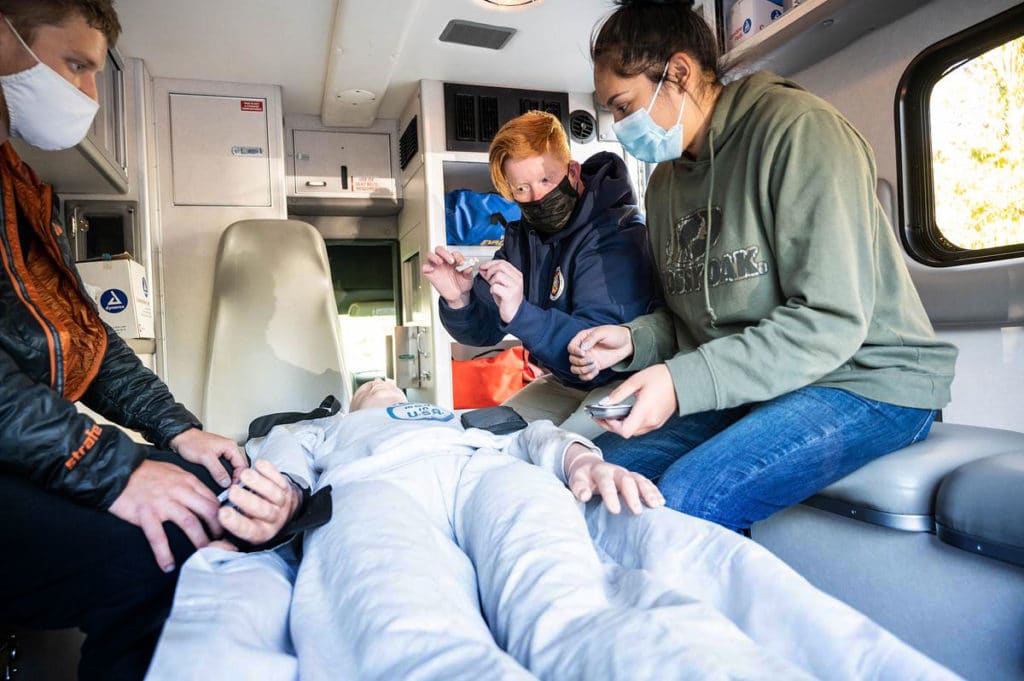Your CMC advisor can help with your plan to become a certified for EMT or EMS service in Colorado.
Q: How do I become state certified in Colorado?
A: You must successfully complete our state/nationally approved EMT-B program (testing, practical skill stations, and clinical rotations) and then pass the National Registry CBT (computer based testing) test. There are other requirements such as a criminal background check, 18 years of age, and establishment of lawful presence in the US. So, you must first become a National Registry EMT-B before applying for State EMT-B certification. Ultimate approval of state and/or national certification is not managed by Colorado Mountain College, but from the National Registry of EMTs and the Colorado Department of Public Health and Environment (CDPHE).
Q: Can I use a current out-of-state EMT certificate to get my Colorado certification?
A: NO! You are required to have certification from the National Registry
Q: Is there a grace period on expired certificates?
A: NO! Your certificate expires on the date it expires. You may not practice as an EMT during this time. The CDPHE (Colorado EMS office) allows up to 6 months after your expiration date to get your paperwork and skills testing complete. The National Registry of EMTs will also not allow you to practice as an EMT past your expiration date.
Q: Is there a re-entry program for Colorado State EMS?
A: NO! Any person whose Colorado EMT certificate is more than 6 months expired is not eligible for renewal and must complete first-time application requirements. The exception to the rule would be that you have a current National Registry EMT-B certification that you could submit to the CDPHE.
Q: How do I reinstate an expired National Registry certification?
A: The following info is from the National Registry of EMTs. To be reinstated once EMT-Basic national registration has lapsed, the candidates must:
- If lapsed within a two-year period, document successful completion of a state-approved DOT National Standard EMT-Basic refresher education program within the past two years; submit a new application and fee; and successfully complete the NREMT-Basic cognitive examination and state-approved practical examination (within the past 12 months) that meets or exceeds Registry standards.
- If lapsed beyond a two-year period and still currently state-certified at the EMT-Basic level, document successful completion of a state-approved DOT National Standard EMT-Basic refresher training course within the past two years; submit a new application and fee; and successfully complete the NREMT-Basic cognitive examination and state-approved practical examination (within the past 12 months) that meets or exceeds Registry standards.
- If lapsed beyond a two-year period and state certification at the EMT-Basic level has also lapsed, document successful completion of a new state-approved DOT National Standard EMT-Basic education program within the past two years; submit a new application and fee; and successfully complete the NREMT-Basic cognitive examination and state-approved practical examination (within the past 12 months) that meets or exceeds Registry standards.
Q: How long are my certifications good for before they expire?
A: As follows:
- American Heart Assoc. CPR: 2 yrs.
- EMT Basic National Registry: 2 yrs.
- Wilderness First Responder: 3 yrs.
- EMT Basic State of Colo.: 3 yrs.
- Community First Aid & CPR: 2 yrs.
- Outdoor Emergency Care: 3 yrs.
EMT certification and recertification is a complicated process. Please call the EMS Education Office at 970-453-6757 ext. 2621 with any questions or concerns.

